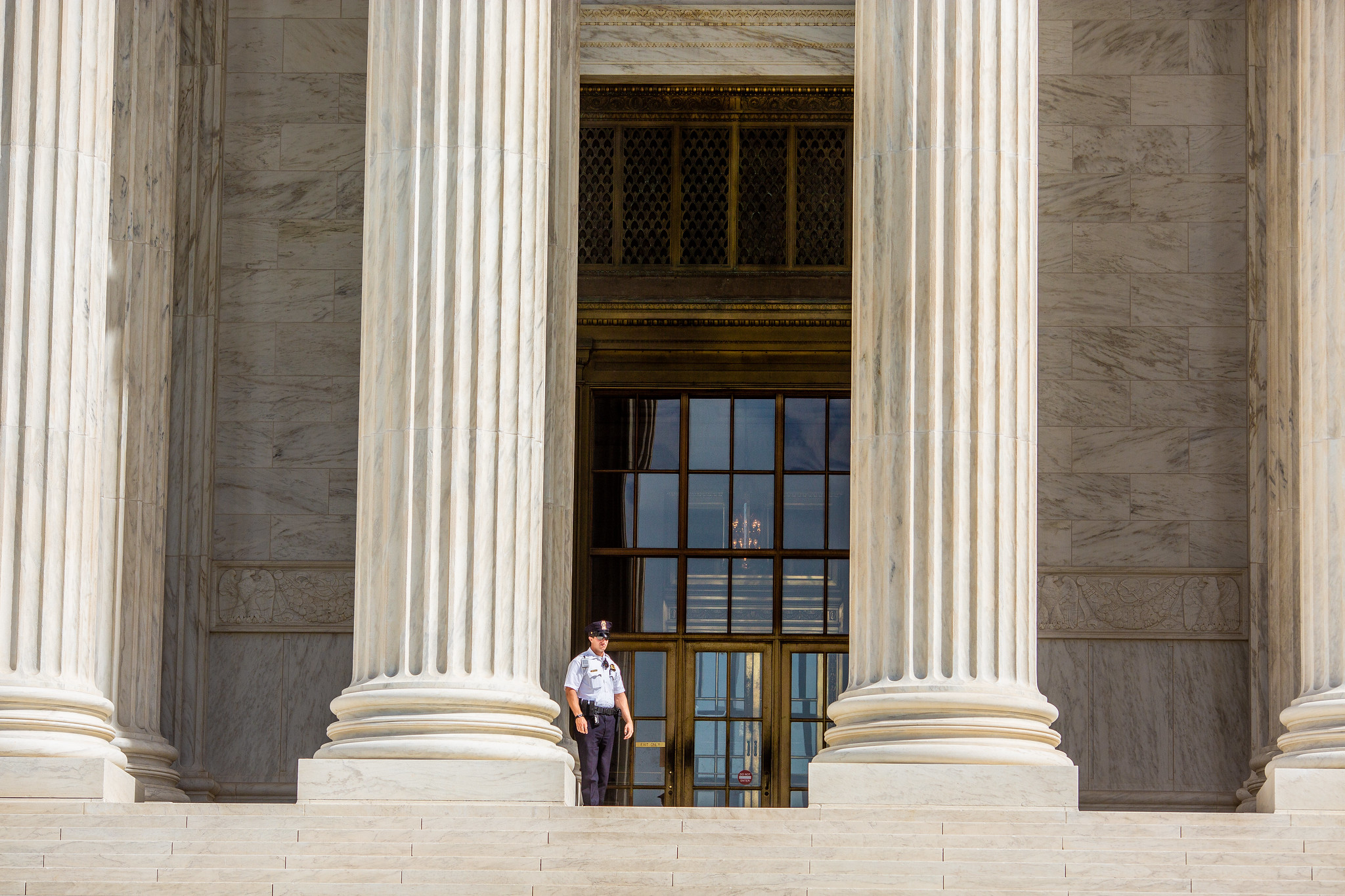Mail Voting Litigation in 2020, Part V: Efforts to Halt Vote-by-Mail Expansion
Across the country, litigants are claiming that expanded mail-in voting will lead to fraud and that state officials lack the legal authority to change the rules related to voting by mail.

This post is the fifth of a five-part series on litigation about mail voting during the 2020 general election. This series is part of Lawfare's collaboration with the Stanford-MIT Healthy Elections Project.
The potential disruption of in-person voting because of the coronavirus pandemic has prompted varied reactions from state governments. Some states, such as California, Nevada, New Jersey and Vermont, announced plans to send mail-in ballots to all registered voters. Other states, such as Connecticut, expanded the list of acceptable excuses for using absentee ballots to include fear of the coronavirus. But not everyone supports the expansion of vote-by-mail or relaxation of rules concerning the use of absentee ballots. In several states, including potential battleground Texas, state officials have refused to expand vote-by-mail access. And just as litigation has sought to expand opportunities for remote voting, litigation has also sought to restrict it.
This post—the last in a five-part series on vote-by-mail litigation—discusses the legal challenges to the expansion of mail voting. These include challenges to state statutes or regulations that authorize the automatic delivery of ballots or ballot applications to all registered voters, relax regulations governing the collection and delivery of mail ballots by third parties, and eliminate witness and notary requirements.
In lawsuits across the country, litigants are presenting two central arguments against vote-by-mail expansion policies. First, opponents claim that expanded mail-in voting will lead to fraud, thereby diluting the value of legal votes, in violation of the First and Fourteenth Amendments. (There is no evidence that vote-by-mail ballots are particularly susceptible to fraud.) Second, opponents argue that state officials lack the legal authority to change the rules related to voting by mail and that major changes must be left to the legislative branch.
Fraud and Vote Dilution
Plaintiffs in Pennsylvania, Nevada, Virginia, New Jersey, Illinois, Montana, Hawaii and Texas have challenged state and county attempts to expand access to mail ballots, arguing that mail voting will increase the incidence of voter fraud. Six of these eight cases are still pending. The plaintiffs in Virginia voluntarily withdrew their case before a ruling on the merits, while federal judges in Nevada and Vermont dismissed the lawsuits on standing grounds, finding that the plaintiffs had not alleged a particularized injury, because any potential vote dilution would affect all voters, not just the plaintiffs in the lawsuits. Although the federal case in Nevada was dismissed, a similar case continues in state court.
The lawsuits challenging mail voting follow a consistent formula. The plaintiffs assert that mail ballots are inherently prone to fraud and that the state has failed to establish basic minimum safeguards to ensure ballot reliability. The complaints often include anecdotal references to instances of voter fraud at the state or local level, using examples from within and outside the state where the suit is filed. The complaints then argue that a spike in fraudulent mail-in ballots will dilute validly cast votes, thereby depriving citizens of their right to vote under the First and Fourteenth Amendments.
The Pennsylvania lawsuit is a prominent example of this pattern of legal argument. There, in federal court, the Trump campaign alleges that mail-in voting “is the single greatest threat to free and fair elections.” The complaint takes aim at the state’s recently passed mail-in voting law, Act 77, which adopted no-excuse mail-in voting for all qualified voters. The complaint quotes from a 2005 report prepared by the Commission on Federal Election Reform, which was co-chaired by former President Jimmy Carter and former Secretary of State James A. Baker, as observing that “[a]bsentee ballots remain the largest source of potential voter fraud.” The complaint also alleges that Pennsylvania has a history of fraudulent elections and that mail ballots will create administrative difficulties and encourage hard-to-detect “ballot harvesting.”
Lawsuits in other states have followed a similar playbook. In federal court in New Jersey, the Trump campaign is challenging Executive Order 177 (codified by the legislature as A4475), which directed the state to automatically send mail-in ballots to all registered voters. After citing allegations of voter fraud in a New Jersey city council election, the complaint argues that Executive Order 177 established an “unauthorized voting system [that] facilitates fraud and other illegitimate voting practices, and therefore violates the Fourteenth Amendment to the U.S. Constitution.” The Trump campaign has also filed a federal lawsuit in Montana, where Governor Steve Bullock issued a directive authorizing “universal vote-by-mail procedures” for federal elections. Citing alleged examples of mail ballot fraud in New Jersey and Nevada, the complaint concludes that fraud is “guaranteed when hundreds of thousands of ballots are indiscriminately distributed.”
The six pending lawsuits that center on voter fraud claims have struggled in the early stages of litigation. In five of these cases, initial rulings have supported expanded mail-in voting (Pennsylvania, Illinois, Nevada, New Jersey and Montana). In fact, a federal judge recently dismissed the New Jersey case. In the Texas case, the state supreme court invalidated a county’s proposed expansion of vote-by-mail, but it did so on grounds unrelated to the plaintiff’s claim that vote-by-mail invites fraud.
Federal district courts have generally rejected fraud-based challenges to vote-by-mail expansion. In the Pennsylvania case, Trump v. Boockvar, Judge Nicholas Ranjan granted summary judgment for Pennsylvania on the grounds that the plaintiffs failed to allege a concrete injury. In a 137-page opinion that touched on multiple aspects of state and federal law, Ranjan held that the Trump campaign’s voter fraud claims were speculative and were “at most … a sequence of uncertain assumptions.” The Trump campaign plans to appeal to the U.S. Court of Appeals for the Third Circuit. In earlier decisions, federal judges in Illinois, New Jersey and Montana took a similarly skeptical view. In Illinois, Judge Robert Dow held that the plaintiff's allegations of voter fraud relied “primarily on unsupported speculation and secondarily on isolated instances of voter fraud in other states and historical examples from Illinois….” In New Jersey, Judge Michael Shipp concluded that the Trump campaign had “faile[ed] to connect … past instances of voter fraud with the relief that they [sought].” And in Montana, Judge Greg Hertz tersely described the allegations of widespread voter fraud in Montana as “fiction.”
State courts have been equally unreceptive to the argument that expansion of vote-by-mail creates constitutionally impermissible opportunities for voter fraud. In a Nevada district court for Clark County, which includes Las Vegas, the Elections Integrity Project challenged a statute (AB 4) that authorized state officials to send mail ballots to every registered voter in the state and permitted third-party ballot collection. In an order denying a preliminary injunction, Nevada Judge Rob Bare concluded that the plaintiffs’ allegations of voter fraud were speculative and lacked “any concrete evidence.” On Oct. 7, the Nevada Supreme Court upheld Bare’s decision on the same rationale.
In a well-publicized case, Texas state courts took a line similar to their Nevada counterparts. On Aug. 25, Chris Hollins, the clerk of Harris County, announced that his office would send mail voting applications to the more than 2 million registered voters in the county. Texas Attorney General Ken Paxton filed for an injunction against Hollins in state court on Aug. 31. The attorney general’s motion argued that a county clerk “lacks the authority to send vote-by-mail applications to every registered voter in Harris County.” Paxton said the practice risked misleading ineligible voters into casting fraudulent mail-in ballots. The district court declined to issue the injunction, and an intermediate appellate court affirmed on interlocutory appeal. The appellate opinion noted that any claims of potential fraud were “speculative” and that Texas had not proved that voters would intentionally violate Texas law by fraudulently applying for mail-in ballots. The Texas Supreme Court eventually struck down the Harris County decision, saying that the Texas Election Code did not allow county clerks to send unsolicited applications for mail-in ballots, especially when a voter was ineligible to vote by mail in the first place.
Lack of Legal Authority
Several other challenges to expanded mail-in voting argue that state officials lack the legal authority to expand mail voting for the general election. There is considerable overlap between this category of lawsuits and the lawsuits that focus on alleged voter fraud. Several of the fraud cases discussed above—including the lawsuits in Montana and Texas—argue that state officials expanded mail voting without statutory authority. In Montana, for example, the Trump campaign argued that Bullock issued his executive order in “direct usurpation of the legislature’s authority.” And, as mentioned above, the Texas Supreme Court held that a county clerk in that state lacked the statutory authority to dispatch vote-by-mail applications to every registered voter in the county.
But some cases have made executive overreach the centerpiece of their argument. These cases argue that state officials exceeded their authority to expand vote-by-mail under state law. For example, in Michigan, a voter and a candidate for the state legislature challenged the secretary of state’s decision to send mail ballot applications to all registered voters. The complaint alleged that the secretary of state had no authority under state law to mail out the applications. After denying a preliminary injunction, the trial court granted summary judgment to the secretary of state. The court concluded that Michigan law gave the secretary “clear and broad authority to provide advice and direction with respect to the conduct of elections and registrations.” This included the authority to mail unsolicited absentee ballot applications. The applications informed voters about their “self-executing right,” under the Michigan Constitution, to cast an absentee ballot. A Michigan appellate court later upheld the ruling.
An ongoing legal dispute in North Carolina also concerns executive action to expand absentee voting. In September, the state Board of Elections issued new guidance to local election officials, easing rules for curing defective absentee ballots. State Republican leaders sued, and a federal district court temporarily blocked parts of the new policy, after mail voting had already started for the general election. The court ruled that, despite the guidance from the Board of Elections, state law barred counties from accepting unwitnessed absentee ballots. This prompted a new round of guidance from the Board of Elections, which was released on Oct. 18. The new policies should allow counties to work through a backlog of more than 10,000 absentee ballots that were set aside and not processed after the court’s ruling, although future litigation is still possible.
The most significant case on the authority of state officials to expand vote-by-mail access has come out of Pennsylvania. Under Pennsylvania law, mail-in ballots must arrive no later than 8 p.m. on Election Day. But in mid-September, the Pennsylvania Supreme Court ruled that enforcing the Election Day deadline during the coronavirus pandemic would violate the Pennsylvania Constitution. The court pointed to the Free and Equal Elections Clause of the state constitution, which holds that elections must be “free and equal,” and which bars any “civil or military” power from “interfer[ing] to prevent the free exercise of the right of suffrage.” The majority concluded that the pandemic was functionally a “natural disaster” that threatened equal access to the right to vote. As a remedy, the court ordered state officials to count ballots that arrive within three days of Election Day, “unless a preponderance of the evidence demonstrates that [the ballot] was mailed after Election Day.”
On Sept. 28, the Trump campaign filed an application for an emergency stay with U.S. Supreme Court Justice Samuel Alito. Among other things, the filing argues that the Pennsylvania Supreme Court’s decision violates the Elections Clause of the U.S. Constitution. That clause states that the “Times, Places, and Manner” of elections “shall be prescribed in each State by the Legislature thereof ....” By extending the deadline, the petitioners argued, the Pennsylvania Supreme Court was supplanting the state legislature’s authority to determine the “Times, Places, and Manner” of the election.
On Oct. 19, a deadlocked U.S. Supreme Court denied the stay application, with Chief Justice John Roberts joining Justices Stephen Breyer, Sonia Sotomayor and Elena Kagan. With the seat vacated by the death of Justice Ruth Bader Ginsburg still empty, the court’s 4-4 split ruling left the Pennsylvania Supreme Court decision intact, though the U.S. Supreme Court’s action has no precedential value. This means that the Pennsylvania petitioners’ argument could still be adopted in the future to uphold laws that state officials find inadequate and that state courts find unconstitutional under state constitutions. A literal interpretation of the word “Legislature” in the Elections Clause would arguably invalidate efforts by state governors and courts to expand mail voting options by, for example, extending absentee ballot deadlines or augmenting ballot delivery options. Readers may remember that this precise argument was adopted by three conservative justices as an alternative means of resolving Bush v. Gore in 2000. There, the concurring justices argued that “to attach definitive weight to the pronouncement of a state court, when the very question at issue is whether the court has actually departed from the statutory meaning, would be to abdicate [the Court’s] responsibility to enforce the explicit requirements of [the Elections Clause].”
It is worth noting that the U.S. Supreme Court has already endorsed a more capacious reading of the Elections Clause than the one adopted by the Pennsylvania petitioners. In Arizona State Legislature v. Arizona Independent Redistricting Commission, the 5-4 majority concluded that the word “Legislature” in the Elections Clause of the U.S. Constitution means the “lawmaking power” of a state. Writing for the majority, Ginsburg argued against a narrow interpretation of the word “Legislature” that encompassed only “the legislative body alone.” Instead, a state’s “legislature” can include the citizen initiative process, executive vetoes, and arguably, state court decisions. (We use the word “arguably” because the Arizona State Legislature majority did not explicitly mention state court decisions in its opinion.
The fact that the other four justices would have stayed the Pennsylvania Supreme Court decision suggests that a more conservative Court might, in the future, welcome the petitioners’ argument. Now that Amy Coney Barrett has filled Ginsburg’s seat on the court, the underlying arguments in this case could return in later litigation.
Conclusion
Overall, litigation in the past few months has broadly favored state officials who have expanded vote-by-mail to meet the surge in demand caused by the coronavirus pandemic. Challenges to state expansions of vote-by-mail have generally failed on the merits, with judges ruling that states acted within their authority and that claims of potential voter fraud were too speculative to warrant relief. However, the U.S. Supreme Court’s 4-4 split in Republican Party of Pennsylvania v. Boockvar raises the prospect of future restrictions on the ability of state executives to respond to public health concerns related to election operations.
As the pandemic continues to rage, mail voting will be a critical factor in the upcoming election. Opponents of mail voting will likely continue to challenge expansions of the practice, and several cases await appeal or initial rulings on the merits. As the election draws nearer, it will be up to states to promulgate legally defensible vote-by-mail strategies, and to balance their citizens’ health and their right to vote.




.jpg?sfvrsn=cb803a66_6)

